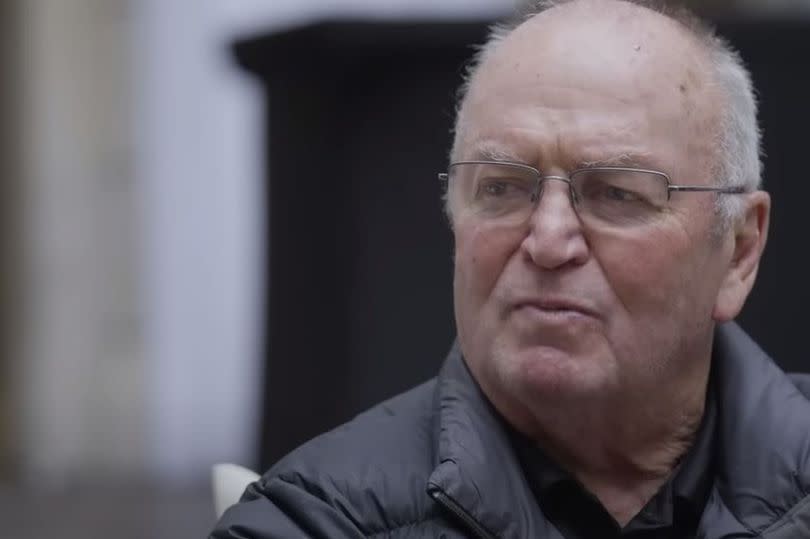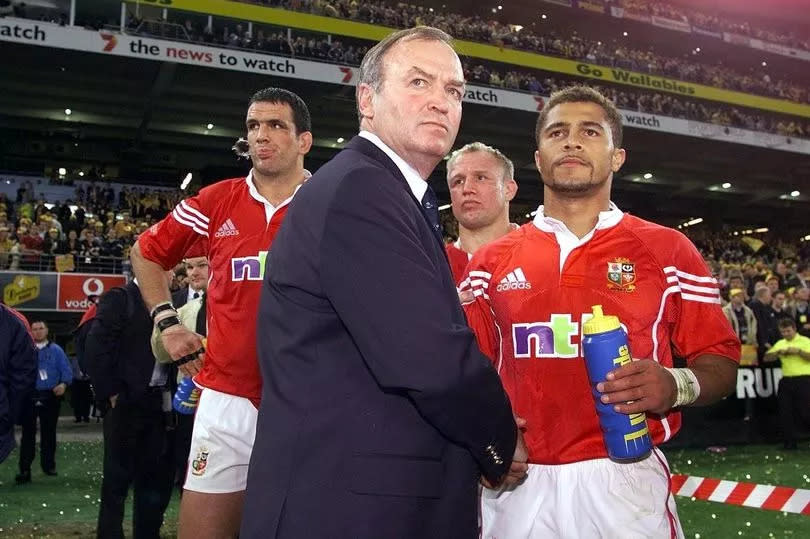Sir Graham Henry interview: My big mistake and the answer to Welsh rugby's problems

There's a wry smile on Sir Graham Henry's face as the fact a quarter of a century has passed since that famous victory over England at Wembley.
"Well, we're still alive!" he remarks.
The 'Great Redeemer' in these parts, the man who ended 24 years of waiting for another World Cup in his homeland of New Zealand. Now 77 years of age, Henry remains as fond of his adopted nation as ever.
"It's a second home," he tells WalesOnline's Welsh Rugby Podcast. "Been back many times. This is just another visit. You always think the last one will be your last!"
SIGN UP: Get the new exclusive Inside Welsh rugby newsletter for full insight into what's really going on around all the big issues. This special offer will get you full access for the entire year for just £10 instead of £40.
The reason for his return is to meet up with the other heroes of that famous occasion in 1999. That day, from Scott Gibbs' try to the sight of Max Boyce and Tom Jones, is forever sewn into the folklore of Welsh rugby.
"I rang Max last time I was in Wales, had a bit of a chat," says Henry. "He went 'oh my god' when I rang him. But it was part of that time.
"A special character and a special Welshman. Tom Jones was singing in the stadium as well. It was an unreal feeling walking from the dressing shed to the coaches' seat. It was electric in there."
Of the 140-odd Test matches he coached, Henry still considers that day in Wembley one of the highlights. Even now, as he recollects, it's clear that the affinity with Wales remains. "We, being the Welsh, were going to give our best and that was enough."
Some of the memories of that afternoon are, understandably, a little hazy after a quarter of a century, but the key points remain intact.
"I know I went and saw Saint David, the patron saint, on the west coast," he recalls. "That was special, asking for his support. The things you do when you're under pressure!
"I remember Garin Jenkins throwing the ball in, I remember Chris Wyatt pushing the ball to Rob Howley. I remember Scott Quinnell was in the backline and he passed the ball, which was probably the first time he passed the ball in his life.
"And I remember Scotty Gibbs dancing, and that's the first time he'd danced in his life. He stepped and stepped and scored between the corner flag and goal posts.
"Jenks was kicking like a dream, probably the best goal-kicker in the world and he was never going to miss. He kicked beautifully and kicked some goals from a long way out to keep us in the game.
"But there were things that happened in that try-scoring event that you don't see often. Quinnell passing, Gibbs stepping. Everything was perfect.
"There was elation, obviously, and it lifted the nation. A win against England, they tell me, is pretty special. The English, it's not a concern to them, which heightened the rivalry. I could use stronger terms! We played England a few times when I was coach and that was the only one we won I think."
Listen to the full podcast with Graham Henry here:
It was one of those other defeats to the rivals across the bridge that provided Henry with one of many "learning curves" that would go on to serve him well once he'd left Wales.
"I remember sitting with Clive Woodward and the English coaches after a game at Twickenham where they'd won quite easily," he explains. "I think it was Blackie (Steve Black), myself, Lynn Howells, Alan Lewis, Alun Carter and David Pickering.
"But they had about 12 staff and we had maybe half a dozen. And Clive said 'You don't expect you six to beat us, do you?' That was a bit of a learning curve. I had been a school teacher. Rugby was my hobby. I was a headmaster until 1996.
"This was only a couple of years later. When I arrived in Wales, I'd only been coaching a year and a half. Before that, I was an educator. So there was a message there."
There were other moments of self-development. The turn of the millennium in a new stadium never quite lived up to the heights reached in that adopted home in London.
"We had a magnificent time here, some difficult times too but you learn from those times," he adds. "I don't know how the Welsh boys put up with me because my coaching at that stage, the team was coach-driven.
"My expectations were massively high and I put a lot of pressure on them to perform. It was how I had been brought up as a rugby player and my rugby experience. It was a dominating, coach-driven environment. I've no excuses for that. It's just what I did.
"When I coached the Lions, I thought there must be a better way to bring the best out of these guys. So I changed, through the experience of coaching Wales and the Lions, to being a team-driven environment. I sat at the back of the bus, if you like, rather than at the front of the bus.
"It was a massive learning curve for me. The poor old Welsh guys went through that learning curve as I went through it."
Even now, he jokes that the 'Great Redeemer' moniker was a fallacy. Sure, there was an 11-game winning run, but by 2002, Henry, in his own words, had "hit the wall" after difficulties with the Lions tour the previous year - an experience he describes as a "lonely" one.
"That was the wrong decision," he said about the 2001 Lions tour of Australia. "But circumstances at the time, I wanted to stick it up New Zealand rugby because they didn't think I was good enough.
"To be asked to coach the Lions was something really special and I didn't want to turn that down. The WRU said I had too much on my plate and said I wouldn't be able to handle this. I thought I was bulletproof, but I wasn't. But I thought I was, so that's ok.
"But I look back and it was a massive learning curve. It quickened up the process of changing. I took full responsibility but I had to share that responsibility with the coaching group and playing group. It was a difficult tour, but what a great way to learn. It just so happens some people had to put up with me as I learned!"

As well as the challenges Henry faced with the national team, the nature of Welsh rugby meant politics were never far away. During his time in the country, he saw the rebel season that had Cardiff and Swansea playing in England, while he was also part of the change to four professional teams - even if he wasn't around for the actual introduction of the regions. Even now, years on, the number of teams and a way of creating more Anglo-Welsh clashes remain the go-to topics in Welsh rugby
"It didn't work out the way I thought it would, but it was trying to make sure these teams had some chance of success," he said on the creation of four professional teams. "These clubs were playing English clubs with more resources and were constantly getting beaten. So I tried to change that, with other people's help. It didn't go down too well with some people.
"There are probably too many teams, with the amount of talent and resources. It's probably spread too thinly. Perhaps there should be three, or even two. We maybe don't have the resources to have four teams. It's a difficult one."
His preference at the time would have been three teams, with one of those in the valleys. "But, you know, history," he admits.
Ultimately, although he says he doesn't know the ins and outs of Welsh rugby's problems, it seems that he feels the answer doesn't necessarily lie with the number of teams, but more with the development of players.
"In the golden days of Welsh rugby, the grammar schools did that," he explains. "For some reason, they did away with that and all the great little coaches who developed them. You've got to re-establish something like that.
"You look at Ireland and they are probably the best developed country in the world. They've got a group of schools that do that. There are a lot more private schools and they are the breeding ground for their professional sides. They've got that system.
"In Wales, we haven't got that system because we don't have those schools. So you need to replace it with something else. What is that? That's the big question.
"Rugby is easy, but the answer in my opinion is finding that equivalent to the Irish model. Whether you have three or four professional teams, that's just a by-product. It's the development that is important."
As for other changes facing the game, he describes the Club World Cup idea as "lovely", but admits it's not as important as the amateur game - what he describes as the foundations - being right. It's something he believes is struggling as much in New Zealand as anywhere else.
Since Henry, the Welsh head coach role has largely been monopolised by New Zealanders. Wayne Pivac, a man Henry knew well from Auckland, ultimately came up short in his three-year spell in the role, sandwiched between Warren Gatland's two reigns.
"Wayne was a good coach, but the pressures of international rugby and the pressure from the decision-makers make it difficult," he says. "My experience with Wayne was he's a good coach and he connected well with players. You saw that in Llanelli.
"International rugby means greater resources and better development programmes than we've maybe got here. Maybe it's not the head coach's problem, but he has to put up with the lack of development going on underneath and he's the one who gets the blame.
"It's a difficult situation. The administrators in the game have to realise, and I'm sure they do, that the foundation is everything."
It's a similar story for Gatland, with his own fate - as Henry notes - tied up in the politics of Welsh rugby.
"He's proved he can do the job," he adds. "His success is phenomenal. He's got all the bits and pieces for the job. He's the result of his environment.
"If the environment isn't right, then let's get the environment right. There are solutions there but it's about the leaders making the right decisions."

 Yahoo News
Yahoo News 
